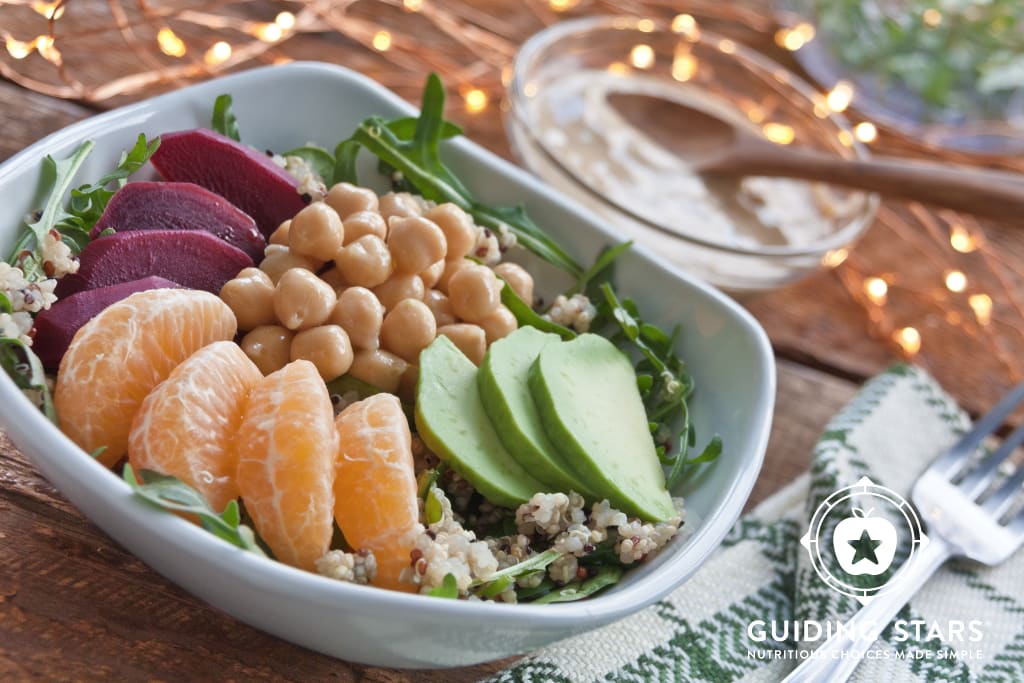With the growing number of coronavirus (COVID-19) cases in our communities, how to protect yourself from getting sick is in everyone’s search history. Of course, the best way to prevent illness is to avoid being exposed to the virus. For this reason, health professionals advise that we practice social distancing as much as possible right now. Boosting our immune systems so we are less likely to get sick sounds super appealing right now. It’s widely circulating online, and some products and diet plans are being marketed to prevent or cure the Coronavirus. Is it even possible to boost our immune systems? Can we do it by improving our diet and eating certain foods? Are there vitamins or herbal remedies that we should consider? What else can we change in our lifestyle to get our immune systems in tip-top shape? Let’s tackle these questions as we discuss healthy ways to support your immunity.
Citrus Bliss Buddha Bowl
Quinoa, chickpeas, and no-salt-added canned beets are all good examples of shelf-stable, nutrient-dense foods.
View recipe »You Can’t Boost Your Immunity
The immune system is incredibly complex, but simply stated, it helps defend our bodies against disease by fighting infection. We can strengthen it through general healthy-living behaviors so it functions normally, but there is no science-backed way to boost our immune systems. We should be wary of those trying to exploit our fears to earn money. Here are a few signs of bad nutrition advice we can look for to avoid getting tricked into buying something we don’t need, or worse, that could cause harm:
- There’s no science involved.
- A food is promised as a “cure.”
- The nutrition expert lacks credentials.
- The diet plan involves selling food and supplements, but no education.
- You’re advised to eliminate an entire food group.
Nutrients that Support Immunity
Despite what unregulated supplement claims might suggest, there is no strong scientific evidence between any specific type of food or supplement and enhanced immune function. It’s true that some parts of the immune system require vitamins and minerals (like vitamins A, C, D and zinc) to function normally, but supplementing with higher doses than the recommended dietary allowance has no proven benefit. Most of the key vitamins and minerals for immune function can be obtained through a healthy balanced diet, but vitamin D might be the exception.
Since vitamin D is found in a limited number of foods (including fortified milk, fatty fish and mushrooms) we are more at risk for deficiency. Vitamin D deficiency is associated with an increased risk of infection. If we spend enough time outside with bare skin, we can create our own from exposure to the sun’s UV rays. However, during winter in certain climates, supplementation may be required to meet our daily needs. Talk with your physician since the dose you need depends on age, gender, and how much you get from food.
Did you know that as much as 70-80% of your body’s immune cells live in your gut, or intestine? The trillions of bacteria and microbes stored in your gut help form your microbiome and strengthen our immune system. Read diet tweaks for a healthy gut here.
Choose Nutrient-Dense Foods
Our diet recommendations to support immunity should come as no surprise. Follow the general MyPlate recommendations because they not only support normal immune function, but also reduce risk for chronic disease such as cancer, diabetes and heart disease. Fill half your plate with brightly colored fruits and vegetables, a quarter with protein-rich foods (like beans, chicken, eggs, and fish), and the remaining quarter with whole grains like brown rice or oats. Most of us should choose low-fat or fat-free dairy foods. Conveniently, MyPlate recommendations inform the Guiding Stars algorithm and our ratings. By choosing foods that earn Guiding Stars, you can be confident you’re making a nutritious choice.
Review our pantry-friendly recipes as you prepare to stay home for a week or two. Do you typically eat outside of your home? We can help you use this opportunity to nurture a cook-at-home habit and refresh on food safety to prevent foodborne illness since many of us are eating differently.
Healthy Behaviors to Practice
We recognize that this is a stressful time for many. In addition to eating a healthy balanced diet, we prioritize a few other things to cope and promote wellness while practicing social distancing. Try to find safe ways to be physically active like going for walks outside while keeping a 6-foot distance from others. Use strategies to reduce stress like meditation. Exercise helps with stress too. Finally, prioritize rest. Aim for about seven to eight hours of sleep per night.
Be well and wash your hands!
